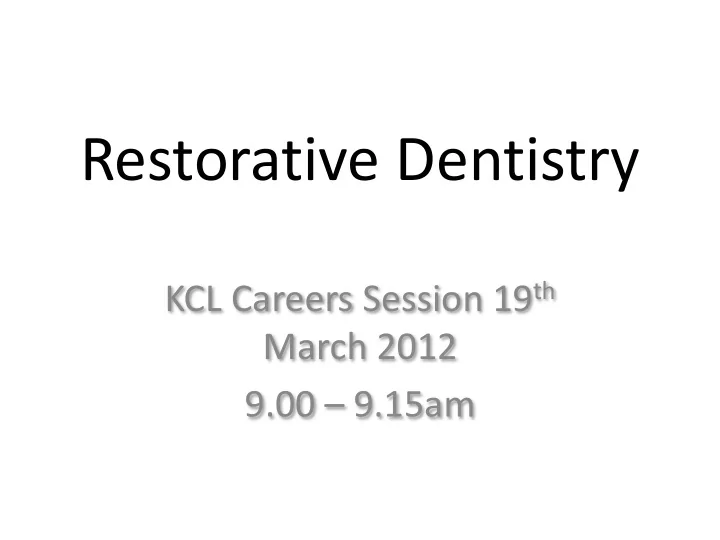

Restorative Dentistry KCL Careers Session 19 th March 2012 9.00 – 9.15am
Peter Briggs BDS (Hons) MSc MRD FDS RCS(Eng) • Consultant Restorative and Implant Dentistry St George’s Hospital, London • Training Programme Director for Restorative Dentistry (Pan London) and DFY2 / CDP (South London)
Restorative Dentistry • 5 year StR training programme within established training programme with NTN • Competency based training against a curriculum written by the RCS in 2009 • Assessment includes WBA (DOPs & CBDs) / log book / CV / publications / teaching etc
Restorative Dentistry • Annual ARCP • Sit ISFE exit examination at final year of training • When successful – then awarded a CCST by the GDC at the 5 year point • 6 months grace to get a Consultant job
Programme • 60% Supervised Clinical • 25% Supervised Research / Knowledge-bases / Didactic / Publications & Teaching – ‘learning to teach others’ – many do teaching diploma • 15% Audit / Healthcare management / Clinical Governance
2009 Curriculum (later modifications)
2009 Curriculum
Curriculum • Mono-Specialties (Prosth / Endo / Perio) – with emphasis on multi-disciplinary care • Maxillo-Facial Prosthodontics / Implantology • MDT care – trauma / development disorders / oncology (attending MDTs /MPTs) – working with other Consultant teams
Post – Operative – only achieved with team work
Curriculum • NHS Healthcare Management • Critical analysis of scientific literature • Pain management / Severe medical compromise • Understand the role, responsibilities and pressures of being a Consultant within the NHS
Why do it? • Will learn varied clinical and non-clinical skills and roles • Surgical and Non-Surgical dental and implant skills • Learn to effectively teach and train others • Research, publish – have a voice and opinion • Deep Learning – really understand the basis for what you do • Will end up on the Rest Dent Specialist list (and also one mono if you do a MRD at year 4)
Recruitment: what do you need to do ? • 4 years of varied clinical experience & training after qualification (practice associate / CDP etc) • Commitment to training and understand what a Consultant is contracted to do within NHS structure • Show excellence, good communication skills, that you can work well within a team, have drive and a hard work ethic and happy to put the needs of patients first • Publication / Audits / Prizes / postgraduate degree - show people like me that you are better than most
Inherent Qualities • Ability to learn and improve • Reflective learning with grounded self- awareness of strengths and weaknesses • Ability to display higher order thinking and problem-solving from first principles • ‘Power’ communication skills • Ability to multi-task and work under pressure • You need a good sense of humour
Type of Consultant jobs • Clinical Academics (Honorary Consultant) – teach U/Gs and run research activity (Dental School) – will have done a PhD plus clinical Rest Dent training – will have a mono interest. Employed by University • Clinical Academics (Honorary Consultant) – teach P/Gs – e.g. MClinDents (Dental School) – most have a taught MSc / MClinDent and a mono-interest – Employed by University
Type of Consultant jobs • Mono-specialty interest service NHS Rest Dent Consultant (Dental School) – there may be MDT duties – Employed by NHS Trust • General Restorative Dentistry Consultant – Acute Trust MDT type care / some teaching jobs are also very general – now sub- specialising more common Oncology / Hypodontia / Trauma – Employed by NHS Trust
Transferrable skills • Can work in primary care – many Consultants like me are part-time practitioners
You will have strong mono skills – be able to advise and manage difficult pain problems and failures and able to take an overall holistic view of what is the best thing to do
Peter Briggs Thanks for your attention and I wish you all the best for the future – remember doing anything worthwhile is difficult!
Recommend
More recommend